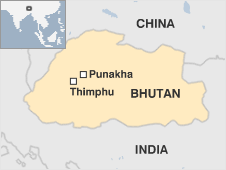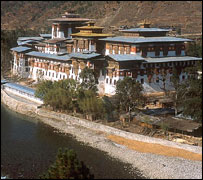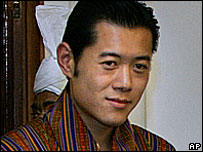Generic Medicines
Taj Pharma is the largest generic pharmaceutical company in India. We hold top positions in different established markets worldwide generics markets..
Bhutan is a tiny remote and impoverished kingdom nestling in the Himalayas between its powerful neighbours India and China.
 |
Almost completely cut off for centuries it has tried to let in some aspects of the outside world while fiercely guarding its ancient traditions.
The Bhutanese name for Bhutan Druk Yul means "Land of the Thunder Dragon" and it only began to open up to outsiders in the 1970s.
The Wangchuck hereditary monarchy has wielded power since 1907. But Bhutan became a two-party parliamentary democracy after elections in March 2008. This gave a landslide victory to the pro-monarchy Bhutan Harmony Party of former prime minister Jigme Thinley. The opposition People's Democratic Party also supports the monarchy.
Bhutan's ancient Buddhist culture and breathtaking scenery make it a natural tourist attraction.
Tourism is restricted; visitors must travel as part of a pre-arranged package or guided tour. Backpackers and independent travellers are discouraged.

Phunaka Dzong: Monks' winter home in the former capital
|
King Jigme Singye Wangchuck - the father of the present monarch - went to great lengths to preserve the indigenous Buddhist culture of the majority Drukpa people. This ethnic group has a common culture with the Tibetans and other Himalayan peoples.
National dress is compulsory - the knee-length wrap-around "gho" for men and the ankle-length dress known as the "kira" for women.
The Bhutanese monarchy has also promoted the philosophy of "Gross National Happiness" (GNH) which strives to achieve a balance between the spiritual and the material.
But by the 1990s attempts to stress the majority Buddhist culture and the lack of any political representation had led to deep resentment among the ethnic Nepali community in the south.
Violence erupted and tens of thousands of Nepali speakers fled to refugee camps in Nepal.
Some 100 000 refugees live in UN-supervised camps in Nepal. Out of this refugee population have sprung a number of insurgent groups - the Bhutan Communist Party (Marxist-Leninist-Maoist) the Bhutan Tiger Force and the United Revolutionary Front of Bhutan.
The Bhutanese security forces believe they are behind the wave of bombings that rocked the kingdom in the run-up to the 2008 parliamentary elections.
The leaders of Nepal and Bhutan had promised to try and repatriate the refugees before the elections. However there has been little progress on this front.
India does not allow the refugees onto its territory which lies between Bhutan and Nepal and although the US and some other countries have agreed to accept tens of thousands of the refugees some refugee leaders say that the only acceptable path is complete repatriation to Bhutan.
Head of state: King Jigme Khesar Namgyel Wangchuck
Jigme Khesar Namgyel Wangchuck succeeded his father Jigme Singye Wangchuck in December 2006 after the former monarch announced his abdication. His formal coronation was postponed until after the country's transformation into a parliamentary democracy had been completed and did not take place until November 2008.

The young monarch promised to build on his father's legacy
|
The new king who was 26 when he became head of state promised to build on his father's efforts to democratise Bhutan. His predecessor had already given up some of his absolute powers in 1998 and ruled in conjunction with the government an assembly and a royal advisory council.
Jigme Khesar Namgyel Wangchuck studied in the US and at Oxford University where he completed an MA in politics.
After graduating the future monarch was encouraged by his father to travel abroad as an ambassador for the Bhutanese people.
He insisted that it was critically important for Bhutan to complete the process of becoming a constitutional monarchy despite the reluctance of many Bhutanese to see a diminution of the monarch's powers.
In the run-up to the March 2008 elections he travelled extensively around the country encouraging people to take part in the vote.
The high regard in which the Bhutanese monarchy is held and the former king's foresight in scaling back its powers makes it unlikely that it will suffer the same fate as the royal family in Nepal.
Prime Minister: Jigme Thinley
Jigme Thinley became Bhutan's first elected prime minister following the country's first polls in March 2008.
He is the leader of the Bhutan Harmony Party which won most votes in the parliamentary election.
The election was intended to mark the completion of the country's peaceful transition from an absolute monarchy to a constitutional one. The move to democratic rule was ordered by the state's popular royal house the Wangchucks.
Mr Thinley has served as prime minister on two previous occasions although the post has hitherto rotated among members of the council of ministers.
He can be expected to wield more power and serve as long as he retains the confidence of parliament and the king.
Born in 1952 he was foreign minister between 1998 and 2003 and later served as home affairs minister.
Television did not come to Bhutan until 1999. For years the country cut itself off fearing that outside influences would undermine its monarchy and culture.
Radio broadcasting began in 1973 and the internet arrived in 1999.
Media freedom is restricted. Reporters Without Borders says the monarchy "makes few allowances for pluralist news".
There are no private broadcasters but cable TV thrives with rival services offering dozens of Indian and international channels.
The first daily newspaper was launched in October 2008.
There were some 40 000 internet users by March 2008 (ITU).
The press
Television
Radio
Bhutan Broadcasting Service (BBS) - state-owned
AFRICA | ASIA-PACIFIC | AMERICAS | EUROPE | MIDDLEEAST | SOUTHASIA
![]()
![]()
![]()
Mauritania Mauritius Morocco Mozambique Namibia Niger Nigeria Republic-of-congo Rwanda Sao-tome-and-principe Senegal Seychelles Sierra-leone Somalia South-africa Sudan Swaziland Tanzania The-gambia Togo Tunisia Uganda Australia Brunei Burma Cambodia China East-timor Fiji Indonesia Japan Kazakhstan Kiribati Kyrgyzstan Laos Malaysia Marshall-islands Micronesia Mongolia Nauru New-zealand North-korea Palau Papua-new-guinea Samoa Singapore Solomon-islands South-korea Taiwan Tajikistan Thailand The-philippines Tonga Turkmenistan Tuvalu Uzbekistan Vanuatu Vietnam Antigua-and-barbuda Belize Bolivia Brazil Canada Chile Colombia Costa-rica Cuba Dominica Dominican-republic Ecuador El-salvador Grenada Guatemala Guyana Haiti Honduras Jamaica Mexico Nicaragua St-kitts-and-nevis St-lucia Suriname Trinidad-and-tobago Uruguay Venezuela Albania Andorra Armenia Austria Azerbaijan Belarus Belgium Bosnia-hercegovina Bulgaria Croatia Cyprus Czech-republic Denmark Estonia Finland France Georgia Germany Greece Hungary Iceland Ireland Italy Latvia Liechtenstein Lithuania Luxembourg Macedonia Malta Moldova Monaco Montenegro Norway Poland Portugal Russia San-marino Serbia Slovakia Slovenia Spain Sweden Algeria Egypt Iran Iraq Israel-and-palestinian-territories Jordan Kuwait Lebanon Libya Mauritania Oman Saudi-arabia Sudan Syria Tunisia United-arab-emirates Yemen Afghanistan Bangladesh Bhutan India Nepal Pakistan Sri-Lanka The-Maldive